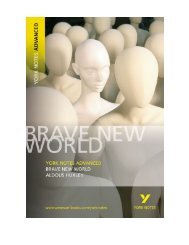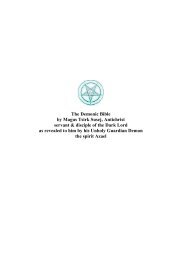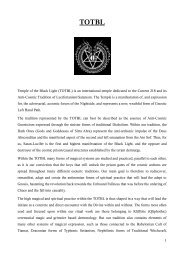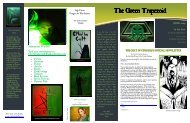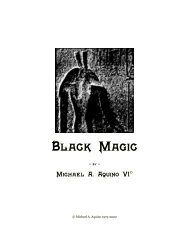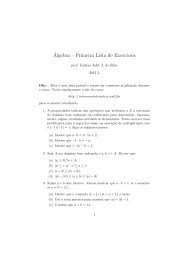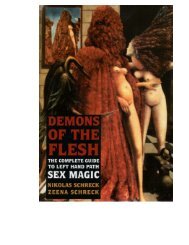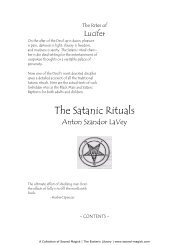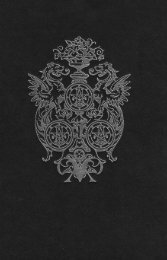Satanism Today - An Encyclopedia of Religion, Folklore and Popular ...
Satanism Today - An Encyclopedia of Religion, Folklore and Popular ...
Satanism Today - An Encyclopedia of Religion, Folklore and Popular ...
Create successful ePaper yourself
Turn your PDF publications into a flip-book with our unique Google optimized e-Paper software.
M<br />
Magic <strong>and</strong> Magical Groups<br />
Widespread acceptance <strong>of</strong> the occult had tapered<br />
<strong>of</strong>f sharply among the educated by about 1750,<br />
but it did not cease altogether, <strong>and</strong> may have<br />
remained more or less constant among peasants.<br />
During the next century, the romantic revival <strong>of</strong><br />
neo-Platonism, medieval German mysticism, <strong>and</strong><br />
astrology; the introduction <strong>of</strong> Asian <strong>and</strong> especially<br />
Indian esotericism; <strong>and</strong> the sudden enthusiasm<br />
for secret societies, Mesmerism, <strong>and</strong> Swedenborgianism<br />
marked the beginnings <strong>of</strong> the modern<br />
recrudescence <strong>of</strong> the occult. With varying degrees<br />
<strong>of</strong> popularity, faddishness, <strong>and</strong> intellectual<br />
respectability, it has remained a nearly ubiquitous<br />
factor in Western cultural life ever since.<br />
In 1801, Francis Barrett, who had gathered a<br />
working magical group around himself, published<br />
The Magus, the first modern book that attempted<br />
to make the arcana <strong>of</strong> magic accessible to the<br />
middle class. At midcentury, Alphonse-Louis<br />
Constant, who wrote under the name <strong>of</strong> Eliphas<br />
Levi, published his Dogma <strong>and</strong> Ritual <strong>of</strong> High<br />
Magic, a History <strong>of</strong> Magic, <strong>and</strong> Key to the Great<br />
Mysteries. These pulled together the disparate<br />
str<strong>and</strong>s <strong>of</strong> Western occultism into the beginnings<br />
<strong>of</strong> a unified system, <strong>and</strong> so became the textbooks<br />
for all the later magical groups. In the 1850s <strong>and</strong><br />
1860s, a group using Barrett’s The Magus as a text<br />
gathered around a psychic named Fred Hockley,<br />
<strong>and</strong> began trying to get Barrett’s <strong>and</strong> Levi’s “magic<br />
157<br />
formulas” to actually work. Hockley owned a set<br />
<strong>of</strong> mysterious magical manuscripts, on which he<br />
based his magical authority.<br />
The late nineteenth century saw the rise <strong>of</strong><br />
“spiritual occultism,” which, as represented by<br />
theosophy, Rudolf Steiner, Gurdjieff, <strong>and</strong> Ouspensky,<br />
<strong>and</strong> a ritual-magical wing (various Rosicrucian<br />
organizations, the Hermetic Order <strong>of</strong> the<br />
Golden Dawn, <strong>and</strong> its <strong>of</strong>fshoots), denies that it is a<br />
religion. It is the mindset <strong>of</strong> spiritual occultism<br />
that leads most modern occult organizations to<br />
deny that they are religions. However, they exhibit<br />
the same ambiguous relation between their foundational<br />
myths <strong>and</strong> their ordinary history that<br />
religions in general do. Rosicrucianism has the<br />
myths set forth in its major documents—the<br />
Chemical Wedding, <strong>and</strong> so on—that claim survival<br />
from antiquity, but in fact it appears to have begun<br />
as a secret organization among Lutherans, since<br />
Luther’s family crest was a rose on a cross.<br />
Freemasonry in Engl<strong>and</strong> began as a secret society<br />
dedicated to restoration <strong>of</strong> the monarchy; when<br />
Charles II ascended the throne, this society<br />
remained intact, but adopted a new purpose.<br />
That is, modern occult organizations typically<br />
claim a great antiquity for themselves, but in fact<br />
are all quite recent, <strong>and</strong> are almost all highly interrelated.<br />
The scholar T. M. Luhrmann has documented<br />
the overlapping memberships in magical<br />
organizations in the London area in the 1980s; this



